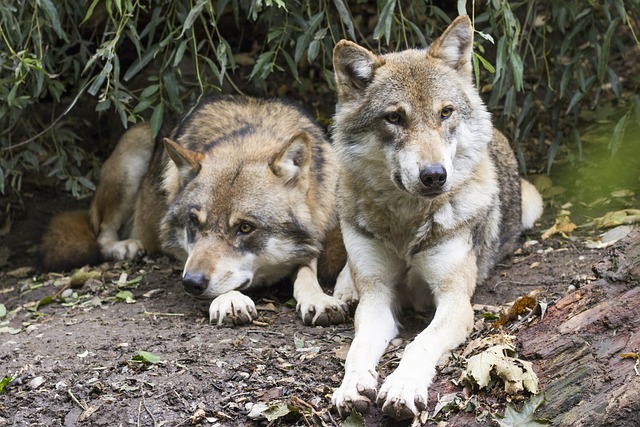Have you ever found yourself wondering about the snacks you can share with your furry best friend? Well, I’m right there with you!
As a proud dog parent, I’ve often pondered whether those crunchy, vibrant carrots that I love so much are safe and tasty for my canine companion.
The answer is absolutely, dogs can eat carrots! Carrots are not only safe for canines but also beneficial in many ways. But like everything, moderation is key.
The Basics of Canine Nutrition

Essential Nutrients for Dogs
Canines, like humans, require a balance of proteins, fats, vitamins, minerals, and carbohydrates.
Their diet should be tailored to their specific needs, which can vary based on age, breed, and health status.
While commercial foods are formulated to meet these requirements, adding some natural treats like carrots can be beneficial.
For an extra boost of protein, you might also consider Pork Pizzles for dogs, a high-protein, single-ingredient treat made from 100% pig pizzle. They support muscle development, promote dental health, and are an excellent option for dogs with sensitive stomachs or beef allergies.
The Role of Vegetables in Their Diet
Vegetables are not a staple in a dog’s diet like they are for humans. However, they can provide canines with essential nutrients and fiber that might be missing from their regular meals.
Carrots, in particular, are packed with vitamins and can be a crunchy treat that many dogs love.
Carrots: A Closer Look
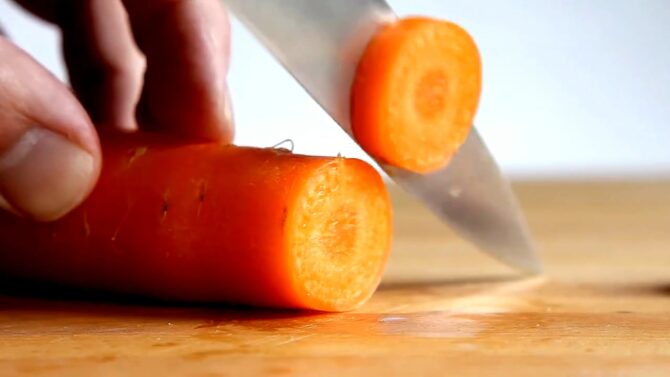
Nutritional Composition of Carrots
Carrots are a rich source of beta-carotene, which gets converted into vitamin A in the body. They also contain vitamins K and C, potassium, and fiber.
These nutrients are beneficial not just for humans but for dogs as well.
However, it’s essential to remember that dogs process certain nutrients differently than we do.
| Nutrient | Amount per 100g | Benefits for Dogs |
|---|---|---|
| Calories | 41 kcal | Low-calorie snack option |
| Carbohydrates | 9.6 g | Provides energy and dietary fiber |
| Fiber | 2.8 g | Supports digestion and bowel regularity |
| Vitamin A | 8352 IU | Promotes healthy vision and immune system |
| Vitamin K | 13.2 µg | Supports blood clotting and bone health |
| Vitamin C | 5.9 mg | Acts as an antioxidant and boosts immunity |
| Potassium | 320 mg | Helps regulate fluid balance and muscle function |
| Beta-carotene | 8285 µg | Converts to vitamin A; supports skin and coat health |
| Antioxidants | Various | Fights oxidative stress and inflammation |
| Low Fat | 0.2 g | Suitable for weight management |
The Taste and Texture Appeal
Dogs are often attracted to the crunchy texture of carrots. This crunchiness can be a pleasant change from their regular soft food.
Moreover, the natural sweetness of carrots can be appealing to many canines, making them an excellent choice for a healthy treat.
Benefits of Carrots for Dogs
Carrots aren’t just tasty; they offer a range of health benefits for our canine companions.
Dental Health
Chewing on crunchy carrots can act as a natural toothbrush for canines. The act of chewing can help remove food particles and reduce the buildup of plaque.
This can be especially beneficial for canines that are prone to dental issues.
Vision Support
Thanks to the beta-carotene in carrots, which converts to vitamin A, they can support eye health. Vitamin A is crucial for good vision, and a deficiency can lead to vision problems in canines.
While it’s rare for dogs to have a vitamin A deficiency if they’re on a balanced diet, adding carrots can be an extra boost for eye health.
Potential Risks and Precautions
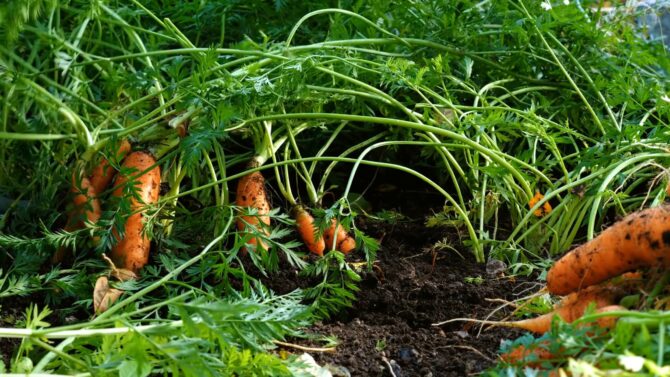
While carrots are generally safe, there are a few things dog owners should keep in mind.
Choking Hazards
Especially for smaller canines or those that tend to gulp down food without chewing, whole carrots can pose a choking risk.
It’s always a good idea to cut them into manageable pieces or offer baby carrots to reduce this risk.
Overconsumption Concerns
While carrots are low in calories, feeding too many can lead to weight gain, especially if they’re given in addition to regular meals.
Additionally, excessive consumption can lead to a condition called carotenemia, where the skin takes on a yellow-orange tint due to high levels of beta-carotene.
Though harmless, it can be alarming for pet owners.
Serving Suggestions
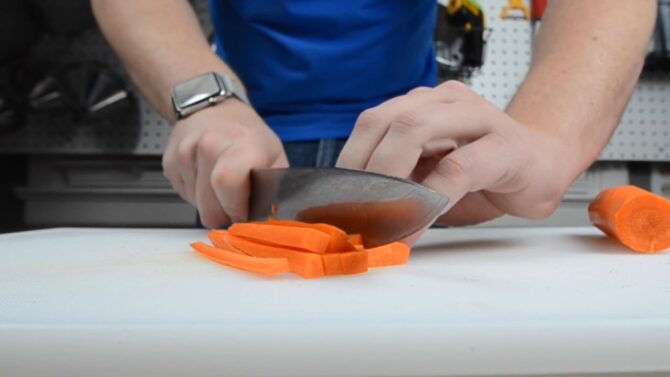
There are various ways to introduce these vegetables into your pet’s diet, ensuring they enjoy the treat while reaping the benefits.
Raw vs. Cooked Carrots
Raw carrots offer a crunchy treat and are excellent for dental health. However, cooking them can make them easier to digest and can enhance their natural sweetness.
Both are safe for canines, so it’s up to the owner’s and dog’s preference.
Incorporating Carrots in Meals
Carrots can be grated and added to your pet’s regular food, or they can be pureed and mixed in. Some owners even make carrot-based treats or popsicles, especially in the summer, for a refreshing treat.
Quantity and Frequency
Like all treats, these should be given in moderation.
Determining the Right Amount
The right amount of carrots for your pet largely depends on their size. A large canine might enjoy a whole carrot, while a smaller dog might only need a few slices.
As a general rule, treats (including veggies like carrots) should not make up more than 10% of a dog’s daily caloric intake.
How Often Can Dogs Eat Them?
While it’s safe to give your pet carrots daily, it’s essential to ensure they’re still getting a balanced diet.
These can be a daily treat, but remember to adjust the quantity based on what else your dog is eating that day.
Carrots vs. Other Vegetables
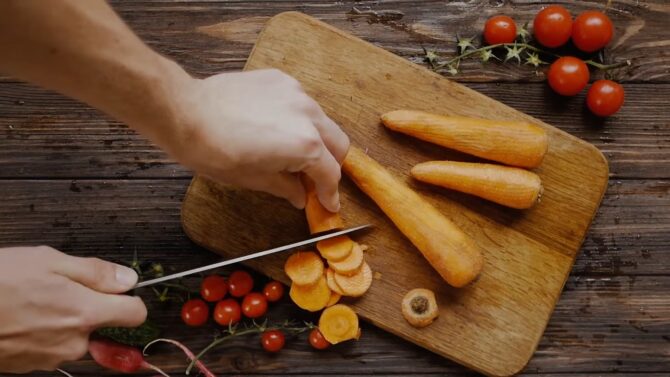
Carrots are just one of many vegetables that are safe for dogs. How do they compare?
Benefits Over Other Veggies
These vegetables are low in calories and high in fiber compared to some other vegetables. Their crunchy texture is also unique, offering dental health benefits that softer veggies might not provide.
Vegetables to Avoid
While many vegetables are safe for dogs, some can be toxic. It’s essential to be aware of these and ensure your pet doesn’t consume them.
For instance, onions and garlic are toxic to canines and can cause serious health issues.
FAQs:
Can dogs eat frozen carrots?
Yes, frozen carrots can be a refreshing treat during hot weather, but ensure they’re not too hard to avoid potential tooth damage.
Are carrots safe for puppies?
Yes, puppies can eat them as a part of their balanced diet. Just ensure the pieces are small enough for them to handle.
Can carrot tops or greens be eaten?
Carrot greens are not toxic, but they are best consumed in small amounts as an occasional treat.
Do they contain any potential toxicity to dogs?
These vegetables are generally not toxic to canines. However, excessive consumption might lead to stomach upset.
Can canines eat canned or pickled carrots?
It’s best to avoid canned or pickled carrots, as they might contain additives, salt, or spices that can be harmful to dogs.
The Bottom Line
Carrots can be a fantastic addition to your dog’s diet, offering a range of health benefits from improved dental health to enhanced vision.
As with any treat or food addition, moderation and proper preparation are key.
Whether you choose to serve them raw, cooked, organic, or non-organic, your pet is sure to benefit from this nutritious treat.
Always consult with your veterinarian if you have specific concerns about your puppy’s diet or health.


